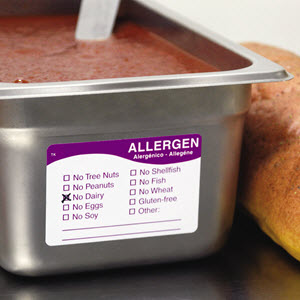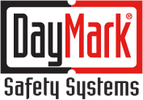If You Have a Food Allergy, Now You’ve Got a PAL
Posted on 15th Sep 2017
Throughout the food industry in the US, we are going to see more voluntary warnings, referred to as advisory statements, on food labels. This includes products found in food displays and grab-and-go food items.
These labels are known as Precautionary Allergen Labels, PALs for short, and are designed to alert consumers that a food item may have had possible contact with a food allergen. The word “possible” is key because many times this allergen contact is unintentional.
Many of us have already encountered these labels. For instance, the PAL on a grocery food item might say “may contain peanuts,” or “may contain soy”.
This unintentional contact is why some PAL labels will include statements like the following:
- “Processed in a facility that uses [almonds or other potential allergen ingredients].”
- “Manufactured using equipment in contact with [milk, soy or eggs].”
- “Produced using shared equipment; may contain trace elements of [milk, wheat].”
At this point, we should clarify that a PAL should not be confused with a label required by FALCPA, the Food Allergen Labeling for and Consumer Protection Act. An FALCPA label is sometimes called an “allergen statement.” A PAL is voluntary while, whereas food processors have been required to post FALCPA information on food labels since 2006.
Today, more than 160 foods have been identified as causing food allergies; however, the eight main foods or food groups are listed below:
- Milk
- Eggs
- Fish (such as bass, flounder, and cod)
- Crustacean shellfish, referring to crab, lobster, and shrimp
- Almonds, walnuts, pecans (tree nuts)
- Peanuts
- Wheat
- Soybeans
We should also note that just because a PAL is a voluntary advisory statement, according to the Food and Drug Administration, it carries the same weight as an FALCPA when it comes to addressing the possibility of an allergic reaction to a food item or an ingredient used in a food item.

Why PALS and FALCPAs are Important to Food Processors
It’s pretty obvious to consumers why having a voluntary or required allergen statement on a food product is necessary. For instance, those of us allergic to soy may suffer nausea, itching, and asthmatic symptoms shortly after consuming a food item containing even trace amounts of soy.
But these labels are also helping to reduce costs and food waste for food processors, and have contributed to elevating food manufacturing standards as well.
According to a 2013 study in the Journal of Food Protection, undeclared allergens are the leading cause of food recalls in the US. And the majority of these recalls – 88 percent – are the result of human error. Possibly an allergen was omitted entirely on a food label, the wrong label was applied to a food product, or incorrect terminology was used on the label.
Many of these human errors can be eliminated with the introduction of DayMark’s Recipe and Menu Management platform, powered by Nutritics. This technology helps food processors identify possible allergens in food items so they can be clearly and correctly noted on food product labels.
Further, the system helps ensure the ingredients and recipes in a food product match the product’s recipe specifications.
Along with the use of new technologies, “food processors are encouraged to implement training programs for employees regarding food allergies,” says Edward Sharek, Category Manager of Facility-Employee Safety at DayMark. “They should also verify that suppliers of finished food products correctly state any allergens in their products”
And because more and more food items, such as grab-and-go food, are now prepared in establishments such as convenience stores, “it is critical to implement strict cleaning, labeling, and documentation protocols,” according to the Food Marketing Institute. “[This will help] effectively manage allergens and ensure accurate information is presented to consumers about allergens.”
For more information on new technologies that make food labeling faster and more accurate, contact a DayMark representative at 1-866-517-0490 .


